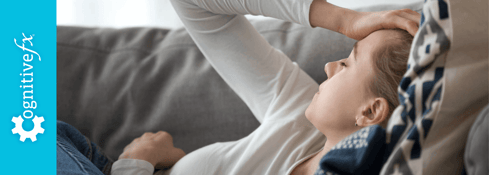It’s not uncommon for people in today’s society to be tired. The demands on our time seem to be never ending. However, there’s a difference between being tired from being on the go all of the time and the feeling of extreme fatigue.
Fatigue can be attributed to many causes, but if your fatigue appeared after a head injury, then it may be caused by a change in your brain due to a concussion (also known as a mild traumatic brain injury, or mild TBI). To complicate matters, those changes to the brain might be affecting several physiological systems, all of which can contribute to fatigue if they aren’t working correctly.
Common questions we get from patients are:
- Why am I so tired all of the time?
- Why do I wake up feeling exhausted, even after I got a good night’s sleep?
- Why do I only have the energy to work a couple of hours in the morning, and then that’s it? I just don’t have the energy to do anything else.
If you’re asking yourself these questions and searching for answers, you are not alone.
At Cognitive FX, we treat patients every week who experienced physical and mental fatigue following a concussion. Most of the common causes of feeling tired after a head injury can be treated — issues like post-concussion sleep difficulties, mental overwhelm, vision problems, hormone changes, and more. We’ll explain…
If you’re experiencing symptoms (including fatigue) that won’t resolve after a head injury, you’re not alone. 95% of our patients experience statistically verified restoration of brain function. To see if you are eligible for treatment, schedule a consultation.
Note: Data relating to brain function mentioned in this post may be from our first generation fNCI scans. Gen 1 scans compared activation in various regions of the brain with a control database of healthy brains. Our clinic is now rolling out second-generation fNCI which looks both at the activation of individual brain regions and at the connections between brain regions. Results are interpreted and reported differently for Gen 2 than for Gen 1 and averages are still forthcoming.
What Causes Post-Concussion Fatigue?
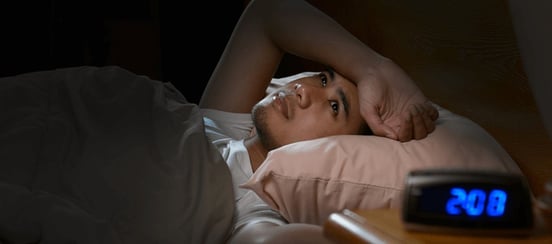
In this article, we’ll discuss some of the more common causes of post-concussion syndrome fatigue, including:
We’ll also discuss steps you can take to find relief and move toward recovery.
Neurovascular Coupling Dysregulation: Why Post-Concussion Changes in Your Brain Cause Fatigue

Imagine you live in a coastal town. A CAT4 hurricane rips through your area, washing out several bridges and roads. While the water is still present, it’s impossible to use those paths for transportation. But even when the waters recede, some of the bridges are unsafe to use. The government will have to send out repair crews; until they’re done, traffic has to go around, no matter how inconvenient or meandering the path.
This is essentially what happens in your brain with neurovascular coupling (NVC) dysregulation. NVC is the system that delivers blood and nutrients — a.k.a, brain fuel — to specific regions of your brain as they need it. After a concussion, this system can malfunction in areas that have been damaged by the brain injury, especially while inflamed (analogous to the roads before the flood waters recede). When an affected area of the brain is trying to work and calls for more fuel, nothing happens. The brain has to find another, less efficient route to accomplish what it’s trying to do. All of this rerouting causes physical and mental exhaustion, especially when it happens day after day.
For example, a commonly injured brain region is the basal ganglia. Among other things, it is responsible for cognitive and physical coordination. It acts as a manager for the brain, directing tasks to the correct brain regions. Without the basal ganglia, your brain has to work with very little direction. Other regions have to pick up the slack, and that will wear you out very quickly, even though it seems like you haven’t done much.
Neurovascular coupling dysfunction can cause constant fatigue, but it can also result in fatigue that worsens after mental activity. If mental effort leads to your fatigue, NVC dysfunction is a likely culprit.
At Cognitive FX, we’ve found that the best way to treat this problem is by using multidisciplinary therapies and the brain’s inherent neuroplasticity to retrain the brain. With help, it will go back to using more efficient pathways. 95% of our patients see statistically verified restoration of brain function after treatment at our clinic.
Sleep Problems
We all know that getting an insufficient amount of sleep at night results in being tired the next day. But what if you’re having trouble sleeping every night? Or what if you’re actually sleeping 8 hours or more per night, but you still wake up feeling exhausted every morning? If you’re wondering if these types of sleep problems can be caused by a concussion, the answer is “Yes.”
About half of the patients we see at Cognitive FX report experiencing sleep disturbances after an mTBI. Most of those problems involve sleeping too much (hypersomnia) or not enough (insomnia).
Patients with hypersomnia sleep many more hours than the average person does. However, they often say that they still feel tired when they wake up, or they need to take multiple naps just to have enough energy to get through the day. Many of them tell us they don’t have dreams at night, which is an indication that they aren’t getting the deep, restorative sleep they need.
Patients with insomnia either have a lot of difficulty falling asleep, or they have trouble going back to sleep when they wake up during the night. They may suffer from extreme drowsiness during the day. They’re not getting enough sleep, and they know it, which often causes them to have even more trouble sleeping.
How can a concussion cause these problems? The simple answer is that the areas of the brain which facilitate sleep can be damaged by a concussion. This prevents the brain from going through its normal cycles and doing all the work that it needs to do while you sleep.
Whether you’re not getting the number of hours of sleep you need, or you’re waking up exhausted despite hours of sleep, the quality of your sleep is insufficient for your brain to do the work it needs to do. The result is fatigue.
So, what can you do? Ideally, you want to seek treatment that corrects the root cause of the problem, such as the treatment program we offer at Cognitive FX. After treatment, many of our patients tell us they are dreaming again. They report waking up feeling refreshed and that they have more energy throughout the day.
In the meantime, there are other accepted ways to try to improve sleep quality and overcome sleep disorders. Poor sleep can have many causes, and concussions are just one potential source. If your sleep got significantly worse after a concussion, then it’s likely related.
Further reading: What to do about post-concussion sleep problems
Hormonal Imbalances
One of the most common symptoms of a hormonal imbalance is tiredness. The primary source of hormone production is the pituitary gland, which is located at the base of the brain. It receives messages from the hypothalamus to produce hormones in the right amounts. Together, they govern your adrenals, thyroid, sex hormones, growth hormone, and more.
You can have a hormonal imbalance without ever having had a concussion. However, a brain injury can damage the pituitary gland and the hypothalamus. This might lead to insufficient or excessive hormone production.
One of the most common hormonal causes of extreme fatigue is hypothyroidism. In addition to tiredness, symptoms include weight gain, increased sensitivity to cold, thinning hair, joint pain, brain fog, and more.
Insufficient cortisol could also be behind fatigue. The adrenal glands produce cortisol and other hormones that regulate your metabolism, your blood pressure, and your response to stress. They receive signals to produce hormones from the pituitary gland. If your adrenal glands aren’t producing enough cortisol, you might have unexplained weight loss, low blood pressure, and lightheadedness, in addition to fatigue.
Since the link between hormonal imbalances and brain injury was only recently established, many doctors don’t even know to look for them after you’re injured. Because of that, getting adequate care with hormone dysfunction after a head injury is often frustrating for patients.
If you suspect hormone dysfunction is contributing to your fatigue and other symptoms, we can refer you to an endocrinologist near our location to investigate hormone dysfunction. This endocrinologist can test your hormone levels and prescribe hormone supplementation if you need it. If you don’t live near our clinic, you'll need to find a local provider to continue treatment.
Further reading: How to talk to your doctor about hormone imbalance
Depression and Anxiety

Disabling fatigue is a common symptom of depression, and depression and anxiety are common in patients suffering from post-concussion syndrome for many reasons. Trauma to the brain itself could cause changes that affect a person’s personality and mental health.
Alternatively, the dramatic lifestyle changes associated with traumatic brain injury often lead to increased depression and anxiety. Some patients have to limit or quit their normal activities for extended periods of time. Some continue to live with headaches and pain, which lead to frustration and isolation. Anxiety, with its constant release of “fight or flight” hormone production, also leaves patients feeling exhausted much of the time.
What’s the solution?
Psychotherapy and other therapies that your physician recommends are critical in treating depression and anxiety. If your depression and anxiety began or significantly increased after a concussion, then getting effective treatment for the concussion is also crucial.
EPIC treatment at Cognitive FX cannot cure these conditions, but many of our patients find their depression and anxiety symptoms — when related to a concussion — improve significantly after treatment. Many have found hope for the first time in years when their post-concussion syndrome symptoms improve or resolve. In turn, that often decreases their fatigue levels.
Further reading: Depression after an acquired brain injury and Why concussions cause anxiety
Vision Problems

Post-concussion vision problems are another source of fatigue we see in our patients. Since they are often undiagnosed or underdiagnosed, people suffering from post-concussion syndrome may not be aware that vision problems are the source of their headaches and fatigue.
For example, many patients who have focusing or eye teaming problems find they get tired quickly when they try to read or work at a computer. An overactive peripheral vision will also cause headaches and the feeling of being overwhelmed in large, visually busy spaces. ANS dysfunction and NVC issues could lead to light sensitivity, further increasing visual symptoms.
When your brain is trying to compensate for vision problems, it’s working hard in the background. That can quickly lead to symptoms like cognitive fatigue, headaches and migraines, a pulling feeling around the eyes, eye fatigue, and more.
Further reading: How to find relief from post-concussion headaches
If you aren’t sure if visual problems are contributing to your fatigue, try to keep track of when you start to feel tired. If you notice a pattern that could be related to vision, we recommend you see an eye doctor (neuro-ophthalmologist) who specializes in rehabilitating vision problems associated with acquired brain injury. There are therapies that can greatly improve or even resolve these issues.
Further reading: Vision problems after concussion
Dysautonomia, Stress, and Exercise Intolerance
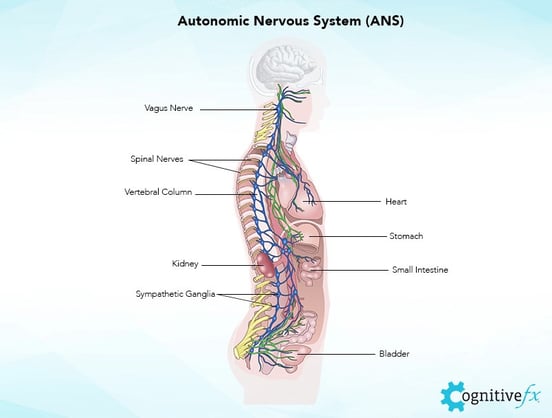
The autonomic nervous system (ANS) is another vital system that can be damaged by a concussion. The ANS controls background processes such as heart rate, digestion speed, and blood pressure. One of its subsystems, the sympathetic nervous system (SNS), helps our bodies respond to stress by activating the “fight or flight” increase in heart rate and cortisol production.
When this system is damaged, however, it often overreacts. For example, if you are hiking in the mountains and suddenly encounter a bear, your heart rate and blood pressure will spike. The SNS calls for a big shot of adrenaline to try to help keep you alive in a very dangerous situation. However, if your SNS is overreacting inappropriately, you might feel like you are meeting that bear (or at least anticipating the possibility of running into the bear) all day long. This pattern of overstimulation will leave you feeling exhausted.
Further reading: Post-concussion autonomic nervous system dysfunction (dysautonomia)
Another complication which could be caused by ANS dysregulation is exercise intolerance, a common symptom in patients with post-concussion syndrome. It can cause headaches, nausea, dizziness, and brain fog during or after exercise. Patients who experience exercise intolerance often stop exercising because it makes them feel so bad. Unfortunately, the less you exercise, the more tired you’ll feel on a regular basis.
Further reading: Exercise intolerance after a concussion, post-injury brain fog, and dizziness from concussion
The ANS can often be retrained to return to normal function with the right therapy. We see this problem with many of our patients and address it in their individualized treatment for post-concussion syndrome at our clinic.
Chronic Pain
Many people suffer from chronic post-traumatic headaches and neck pain after a concussion. Dealing with constant pain is difficult and exhausting. It definitely contributes to extreme fatigue after a concussion.
Many people try treating their pain with various medications and therapies. Unfortunately, medication often comes with side effects, especially for brain injury patients. There are many reasons post-concussion patients need to choose their medications carefully, including altered post-injury metabolism, the fact that most medications were not designed to fix the problems stemming from concussion, and more.
If the pain is caused by a concussion and the symptoms have lasted longer than a few weeks, it’s unlikely the symptoms will improve long term unless the root cause is treated.
How Long Does Concussion Fatigue Last?

Concussion fatigue can last anywhere from a few days to years. It all depends on how long the autonomic and neural dysfunction caused by the concussion lasts. If your fatigue lasts for more than three months, it will likely not go away without treatment.
It’s difficult to predict who will experience long-lasting fatigue and other symptoms. Some people think that loss of consciousness is a predictor for length of symptoms, but it is not. Most of our patients (all of whom suffer from persistent concussion symptoms) never lost consciousness.
Some possible predictors of the need for extended recovery include…
Is There a Link Between Post-Concussion Syndrome and Chronic Fatigue Syndrome?
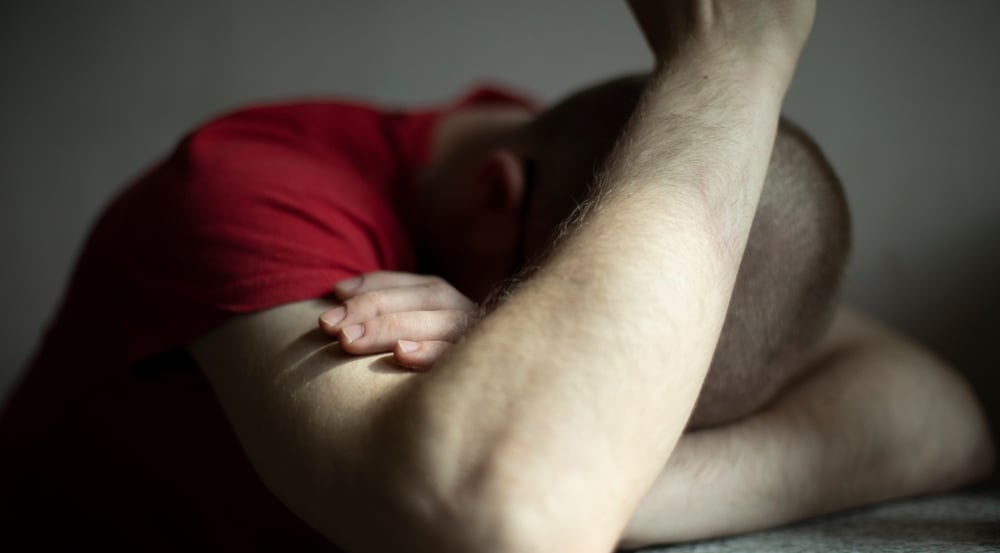
Chronic fatigue syndrome (CFS) is a perplexing illness of unknown cause. The primary symptom is extreme, disabling exhaustion. People who suffer from CFS often also experience trouble sleeping, dizziness, difficulty concentrating, and pain. There is no known cure. Medical professionals typically resort to treating individual symptoms and teaching patients coping mechanisms.
The symptoms of chronic fatigue syndrome have significant overlap with those of post-concussion syndrome. Is it possible that there’s a connection between the two? That’s something we don’t know yet.
You can be diagnosed with CFS without ever having had a concussion. That said, we have seen patients in our clinic who were diagnosed with CFS, but whose symptoms were actually being caused by a brain injury. This was only true of patients who experienced head injuries (unfortunately, we can’t treat chronic fatigue patients who have not experienced a head injury). These patients can usually be helped by targeted, post-concussion treatment.
What Can You Do to Manage Fatigue?

If you have been coping with any of these symptoms due to a concussion, you probably want to know what you can do now to relieve them.
While we believe getting appropriate treatment is the best way to overcome the symptoms of fatigue, there are some strategies you can use at home to help:
Nutrition
It’s always a good idea to evaluate your diet and check for any nutritional deficiencies. Ask your healthcare provider to check your vitamin and mineral levels. Be sure to include healthy “brain foods” in your diet, such as wild salmon, nuts, seeds, and avocados. Include whole grains, fresh fruits, and vegetables. Avoid processed and sugary foods. If you’re able, consider an anti-inflammatory diet.
If you have access to one, a nutritionist can help you examine your diet and provide more specific guidance. Supportive family members can assist by helping you plan your meals, keep you accountable about your food choices, or even embark on a healthier diet with you if you wish. Poor nutrition can make you feel tired, whereas the right foods for brain recovery can boost your energy.
Further reading: Nutrition for post-concussion syndrome recovery
Physical Activity
Exercise is an ironic solution to fatigue, but it’s essential to increasing your energy levels. It’s also crucial to recovery from post-concussion syndrome and dysautonomia. The chemicals released by your brain during exercise are key to boosting neuroplasticity and relieving mental and physical fatigue. Exercise is also commonly recommended if you’re suffering from depression or anxiety.
Further reading: Physical exercise for brain injury recovery
Stress Reduction
Stress reduction is important to reducing fatigue and to improving mental and physical health. Meditation, mindfulness, breathing exercises, physical exercise, and finding ways to laugh can all help. If you examine all of your activities, which contribute the most to your quality of life? Which make you the most stressed?
Sometimes, there’s no way to avoid the things that cause us the most stress, but if you can reduce the stressors in your life, at least for a time, it will give your system some breathing room for recovery. It might help to avoid bright lights and crowded spaces, for example, even if you aren’t able to take time off your work.
Activity Modification (Take Active Rest Breaks)
Another option is to pay attention to your daily activities. Is there a point when you just seem to push yourself too far, and you suddenly become absolutely exhausted? If a pattern develops, try to keep your activities under the limit that pushes you too far.
You might find the Rule of Three helpful in determining when to rest. If you notice either…
- Three different symptoms all worsening at the same time, or
- One symptom increasing by three on a six-point pain scale
…then it’s time for a break. Keeping yourself from slipping into complete mental overload will help you stave off overwhelming fatigue.
Further reading: How to rest your brain more effectively after an injury
Get Treatment for Fatigue and Other Symptoms at Cognitive FX
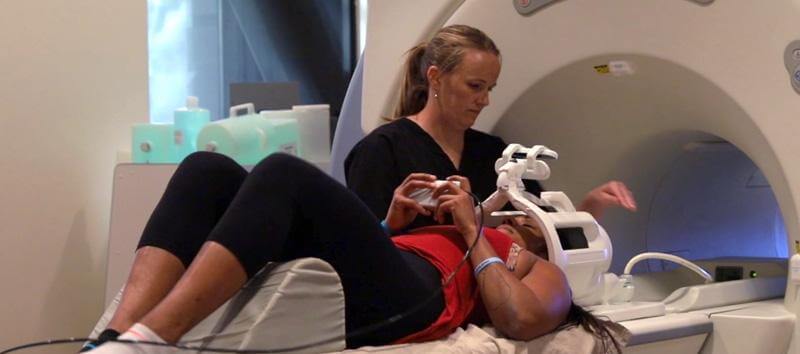
Extreme fatigue is a common post-concussion symptom, but it’s also difficult for many doctors to treat effectively because there are so many components that may contribute to your exhaustion post injury.
If you’re exhibiting other common concussion symptoms — cognitive deficits such as brain fog, slow executive function, memory problems, difficulty finding words or following conversations, etc., and physical impairments such as neck pain and tension, headaches, gastrointestinal problems, exercise intolerance, etc. — then it’s likely all related to your head injury.
At our post-concussion clinic, we can provide therapy to help with tiredness caused directly by your concussion, by sleep problems, by ANS dysregulation, and by vision problems. We can recommend follow-up visits to other specialists to help with hormonal imbalances and depression, and there is a chance our treatment will directly improve them as well.
Fatigue from chronic pain often improves when you treat the source of the chronic pain — something that may or may not resolve, depending on what’s causing the pain.
We believe the best solution targets your specific areas of injury to improve your health. We’ve helped many people do just that through our treatment program. Patients receive an fNCI scan (a type of fMRI) at the beginning and end of their treatment so that we can see exactly which regions of the brain were affected by head trauma.
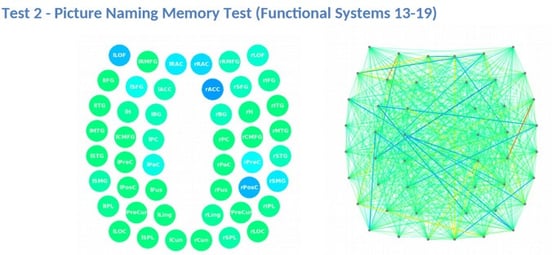
Patients complete specific cognitive tests while in the MRI machine. We can then see which brain regions are hypoactive (underperforming) and whether there are brain regions that are over- or under-communicating with other brain regions. We then tailor our treatment program to target those areas of the brain for recovery, taking into account the patient’s performance on other tests and their self-reported symptom questionnaire.
Further reading: CT scans for concussion and MRI scans for post-concussion syndrome
Treatment is overseen by clinicians in neurology and neuroscience fields, including a clinical neuropsychologist, multiple neuroscientists, a neurosurgeon, a psychologist, and others. Our therapy interventions include a combination of cardiovascular exercise, multidisciplinary therapies, and brain rest. Some treatment modalities include…
Our patients self-report a 48% improvement in fatigue symptoms and a 54% improvement in sleep quality after a week of treatment at our clinic. Those numbers usually improve when patients return home and do their homework (the specific post-care regimen we’ve prepared for them).
Ready to start your recovery? Contact us for a consultation. We’ll review your medical history and symptoms and help you understand if post-concussion treatment is an appropriate option for your care.














